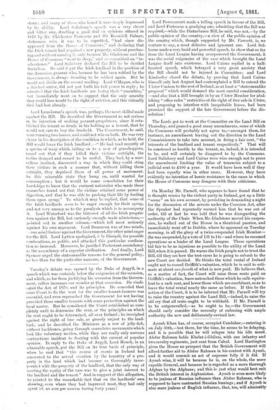fiord Lansdowne's speech was, perhaps, the most skilful made against
the Bill. He described the Government as not serious in its intention of making peasant-proprietors, since it esta- blished the tenant so firmly in his holding as a tenant, that he would not care to buy the freehold. The Government, he said, were running two horses, and could not win on both. He was very clever in his description of the condition in which, as he held, the Bill would leave the Irish landlord :—" He had read recently of a species of wasp which, falling on to a nest of grasshoppers, found out that if they killed their victims outright, the bodies decayed and ceased to be useful. They had, by a mar- vellous instinct, discovered a way in which they could sting their victims in such a manner that, without killing them outright, they deprived them of all power of movement. 1 a this miserable state they hung on, until wanted for consumption ; but it would be some • consolation for their Lordships to know that the eminent naturalist who made these researches found out that the victims retained some power of digestion, and that he was able to prolong their life by feeding them upon syrup." To which it may be replied, that some of the Irish landlords seem to be eager enough for their syrup, and not very uneasy as to the paralysis which is to accompany it. Lord Waterford was the bitterest of all the Irish proprie- tors against the Bill, but curiously enough, made admissions,— pointed out in another column,—which tell most seriously against his own argument. Lord Dunraven was of two minds, --one mind furious against the Government, the other mind eager for the Bill. Lord Lytton apologised, a la Disraeli, for possible confiscations, as politic, and attacked this particular confisca- tion as immoral. Moreover, he justified Protestant ascendancy as the ascendancy of a superior civilisation. And finally, Lord Spencer urged the statesmanlike reasons for the general policy, uo less than for the particular measure, of the Government.






























 Previous page
Previous page